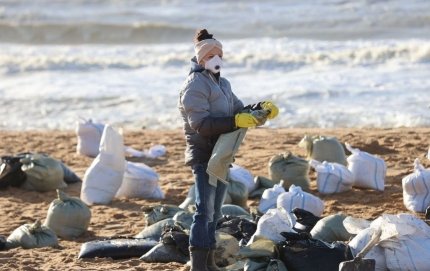According to Dmitry Volovik, director of the Azov Sea National Nature Park, a large-scale oil spill occurred in the Sea of Azov after the accident of the Russian tankers Volgoneft 212 and Volgoneft 239.
Points of attention
- The Russian tanker accident in the Sea of Azov has resulted in a large-scale environmental disaster with serious consequences for the local fauna and ecosystem.
- The oil spill from the accident has polluted parts of the coast in the Zaporizhia region and the Azov Sea National Nature Park, threatening the biodiversity of the region.
- Due to limited access to the occupied territories of Russia, it is challenging to determine the exact level of pollution in the Sea of Azov, raising concerns about the long-term impact on the environment.
- The ecologist highlights that the local fauna, including mussels, gulls, and other seabirds, will suffer significant harm from the oil spill, leading to potential population declines and ecosystem disturbances.
- The lack of appropriate measures taken by Russian authorities post-accident poses a threat to the entire Sea of Azov and surrounding areas, emphasizing the need for vigilance and environmental protection efforts by Ukraine and local authorities.
What does the accident of Russian oil tankers in the Sea of Azov threaten the region and Ukraine?
Volovyk noted that as a result of the accident, part of the coast in the Zaporizhia region was polluted, in particular, the Azov National Natural Park.
A very serious stain. The oil product discharge strip runs along Stepanivska Spit — 4.4 km, along the economic zone, that is, Kyrylivka — approximately 18.7 km, the Fedotova Spit reserve towards Byrychugy — 1.7 km. That is, the entire coast. We know 100%. As for our territory of the nature reserve fund, a wind has come and is driving the fuel and lubricants stain away from the shore, — the ecologist emphasized.

According to him, it is currently not possible to accurately determine the level of pollution in the Sea of Azov and coastal soils due to the fact that Ukraine does not have access to the territories occupied by Russia.
What will be the long-term consequences of the Russian tanker accident in the Sea of Azov?
However, Volovyk emphasized that it is the local fauna that will obviously suffer the most from the oil spill.
We can’t even imagine the whole trouble. We have limited access to this information. Benthos is a mussel, such natural filters that make up the bottom of the entire Sea of Azov — they will suffer enormous damage, the consequences will be noticeable for more than one year. Gulls, sea gulls in particular, waterfowl, will be in very serious trouble, they will, unfortunately, die. For gobies, the trouble is a population drop in the spring, when spawning phenomena will begin, when the water will warm up, — emphasizes the director of the Azov National Nature Park.
Volovyk also noted that the authorities of the aggressor country are not taking any measures after the tanker accident and oil spill.
"The security in the so-called Russian Federation is not working: neither is the Ministry of Emergency Situations, nor is anyone working there. It will be a disaster for the entire Sea of Azov," the ecologist emphasized.




